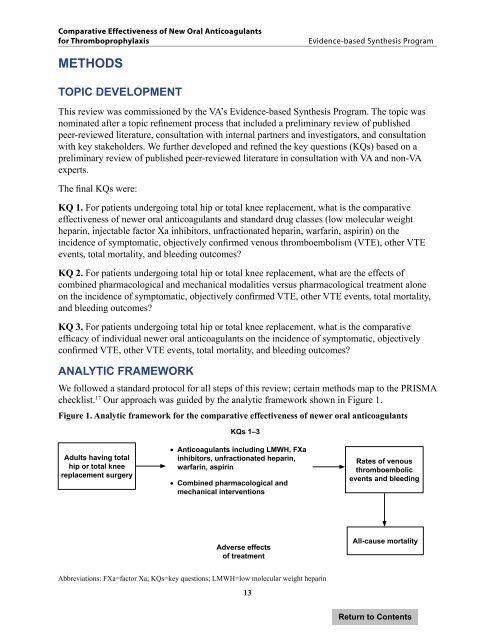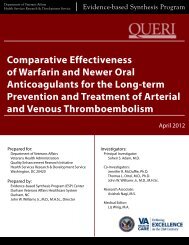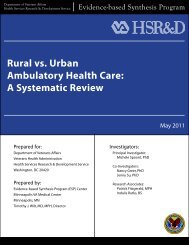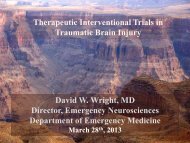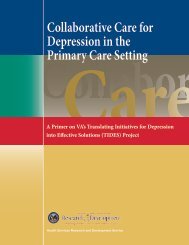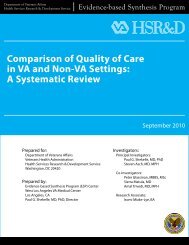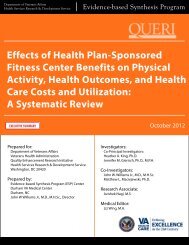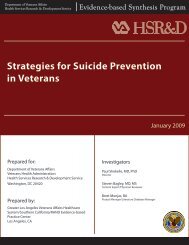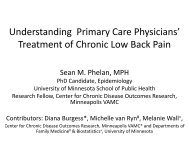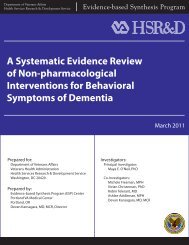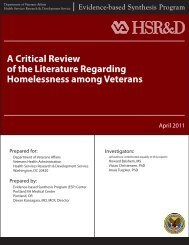Comparative Effectiveness of New Oral Anticoagulants for ...
Comparative Effectiveness of New Oral Anticoagulants for ...
Comparative Effectiveness of New Oral Anticoagulants for ...
Create successful ePaper yourself
Turn your PDF publications into a flip-book with our unique Google optimized e-Paper software.
<strong>Comparative</strong> <strong>Effectiveness</strong> <strong>of</strong> <strong>New</strong> <strong>Oral</strong> <strong>Anticoagulants</strong><br />
<strong>for</strong> Thromboprophylaxis<br />
Evidence-based Synthesis Program<br />
METHODS<br />
TOPIC DEVELOPMENT<br />
This review was commissioned by the VA’s Evidence-based Synthesis Program. The topic was<br />
nominated after a topic refinement process that included a preliminary review <strong>of</strong> published<br />
peer-reviewed literature, consultation with internal partners and investigators, and consultation<br />
with key stakeholders. We further developed and refined the key questions (KQs) based on a<br />
preliminary review <strong>of</strong> published peer-reviewed literature in consultation with VA and non-VA<br />
experts.<br />
The final KQs were:<br />
KQ 1. For patients undergoing total hip or total knee replacement, what is the comparative<br />
effectiveness <strong>of</strong> newer oral anticoagulants and standard drug classes (low molecular weight<br />
heparin, injectable factor Xa inhibitors, unfractionated heparin, warfarin, aspirin) on the<br />
incidence <strong>of</strong> symptomatic, objectively confirmed venous thromboembolism (VTE), other VTE<br />
events, total mortality, and bleeding outcomes?<br />
KQ 2. For patients undergoing total hip or total knee replacement, what are the effects <strong>of</strong><br />
combined pharmacological and mechanical modalities versus pharmacological treatment alone<br />
on the incidence <strong>of</strong> symptomatic, objectively confirmed VTE, other VTE events, total mortality,<br />
and bleeding outcomes?<br />
KQ 3. For patients undergoing total hip or total knee replacement, what is the comparative<br />
efficacy <strong>of</strong> individual newer oral anticoagulants on the incidence <strong>of</strong> symptomatic, objectively<br />
confirmed VTE, other VTE events, total mortality, and bleeding outcomes?<br />
ANALYTIC FRAMEWORK<br />
We followed a standard protocol <strong>for</strong> all steps <strong>of</strong> this review; certain methods map to the PRISMA<br />
checklist. 17 Our approach was guided by the analytic framework shown in Figure 1.<br />
Figure 1. Analytic framework <strong>for</strong> the comparative effectiveness <strong>of</strong> newer oral anticoagulants<br />
KQs 1–3<br />
Adults having total<br />
hip or total knee<br />
replacement surgery<br />
• <strong>Anticoagulants</strong> including LMWH, FXa<br />
inhibitors, unfractionated heparin,<br />
warfarin, aspirin<br />
• Combined pharmacological and<br />
mechanical interventions<br />
Rates <strong>of</strong> venous<br />
thromboembolic<br />
events and bleeding<br />
Adverse effects<br />
<strong>of</strong> treatment<br />
All-cause mortality<br />
Abbreviations: FXa=factor Xa; KQs=key questions; LMWH=low molecular weight heparin<br />
13


